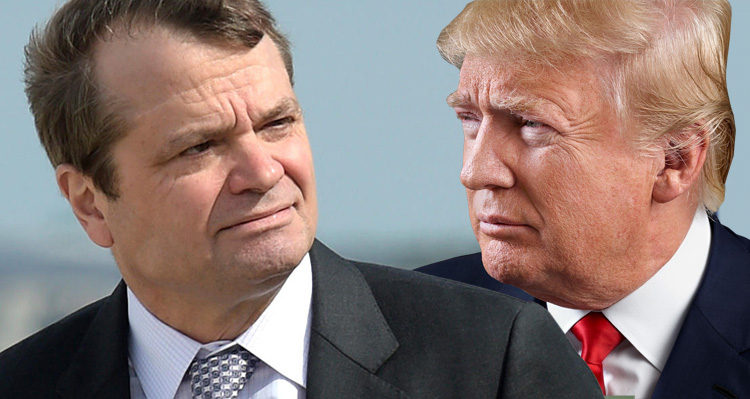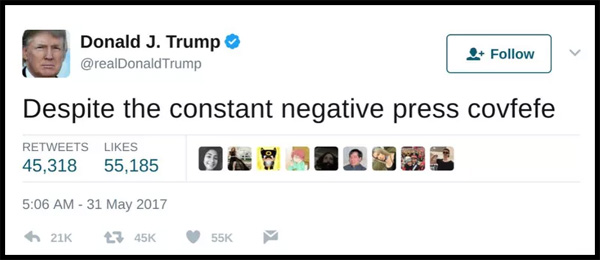
Democratic Congressman proposes legislation to hold Trump accountable for his social media outbursts while mocking him at the same time.
Social media was ablaze over a confusing early morning tweet containing an odd typo or misspelling posted by Trump at the end of May:

As The Verge reported at the time: “The president’s cryptic missive remained online for several hours, before getting pulled around 6AM ET this morning. Trump’s lack of punctuation suggested that he had been whisked away before he could complete his dire warning, but terrifyingly, we still don’t know what covfefe is. Academics, scientists, politicians — none had predicted its coming, and none had warned us of what it might bring, but one thing was clear from the tone of tweet. Covfefe was bad.”
Trump tried to downplay the error the following morning, tweeting: “Who can figure out the true meaning of ‘covfefe’ ??? Enjoy!”
Who can figure out the true meaning of "covfefe" ??? Enjoy!
— Donald J. Trump (@realDonaldTrump) May 31, 2017
But it was too late, as Twitter and other social media sites and news agencies exploded in hilarity when users and journalists began trying to define “covfefe.”
However, roughly two weeks later – Democratic Rep. Mike Quigley of Illinois may have gotten the last laugh when he introduced the “Communications Over Various Feeds Electronically For Engagement” Act on Monday, otherwise known as the “COVFEFE Act.”
As NBC News reports, although the White House has promised to preserve all of Trump’s tweets including ones that have been previously deleted, Rep. Quigley wants legislation to make sure his administration follows through.
Quigley, who represents parts of Chicago, introduced the “Communications Over Various Feeds Electronically For Engagement” Act on Monday, designed to amend the Presidential Records Act to categorize social media posts as official presidential communications that must be preserved for posterity.
Quigley’s spokeswoman, Tara Vales, told NBC News that “The name might be silly, but the issue’s really important and serious.”
Continuing, NBC News reports that: “Like most matters presidential, Trump’s use of Twitter is a subject of much controversy, especially after Spicer said last week that Trump’s tweets should be regarded as official statements of policy.”
On Monday, a three-judge panel of the 9th U.S. Circuit Court of Appeals took Spicer up on his offer. It cited Spicer’s statement in its unanimous decision upholding a lower-court decision to block Trump’s executive order to temporarily block entry into the United States by travelers from six mostly Muslim countries.
The court then went on to cite Trump’s tweet last week declaring that “we need a TRAVEL BAN for certain DANGEROUS countries” as support for actually regarding the order as a blanket, and likely unconstitutional, “travel ban.”
That's right, we need a TRAVEL BAN for certain DANGEROUS countries, not some politically correct term that won't help us protect our people!
— Donald J. Trump (@realDonaldTrump) June 6, 2017
The National Archives already declared in 2014 that presidential social media posts should be handled as official documents, but as NBC News explains “it remains unclear whether that policy applies to his personal account, @realDonaldTrump, in addition to his official account, @POTUS,” however, Quigley’s COVFEFE ACT would make that interpretation federal law.”
ABC News reports that “Quigley said the bill would make sure that the president is held accountable for his social media activity.”
“In order to maintain public trust in government, elected officials must answer for what they do and say; this includes 140-character tweets,” Quigley said in a statement Monday. “Tweets are powerful, and the President must be held accountable for every post.”
“President Trump’s frequent, unfiltered use of his personal Twitter account as a means of official communication is unprecedented,” Quigley continued. “If the President is going to take to social media to make sudden public policy proclamations, we must ensure that these statements are documented and preserved for future reference.”

You must be logged in to post a comment Login